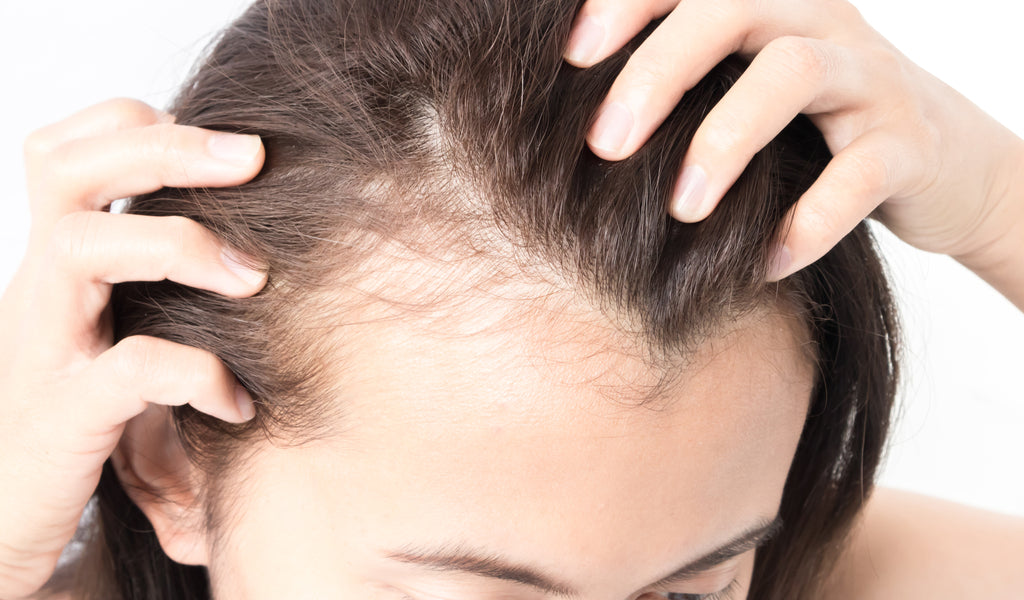Lifestyle Changes and Herbal Remedies for Thinning Hair
If you're dealing with thinning hair or hair loss, understanding the cause can help you move forward. Hair loss comes in multiple forms, can range from mild to severe, and has many causes and remedies. Also known as alopecia, it affects both men and women, although it's more common among men.
Hair Loss Causes
Learning what causes alopecia is the first step in finding a remedy for thinning hair. Here are some of the most common causes of hair loss:
- aging
- stress
- heredity
- pregnancy
- medications
- hormonal changes
- medical treatments
- nutritional deficiencies
- illness, infections and disorders
- female- or male-pattern baldness
- emotional or physical trauma or shock
See your doctor to ensure that your thinning hair isn't caused by an underlying condition. Once you've ruled out illness and infection, trial-and-error can help you find the right hair loss remedies for you.
Alopecia Areata
This type of alopecia is triggered by an attack on the immune system. With this autoimmune disorder, the body reacts to the invasion by losing hair in clumps. Hair loss may be temporary or permanent and can range from mild to severe. Some with alopecia only experience some thinning, while others lose all the hair on their heads or even the entire body. Alopecia areata can be managed with methods ranging from stress reduction to prescription drugs and topical treatments.

Female- and Male-Pattern Baldness
Most hair loss among men is caused by male-pattern baldness. Loss of hair can range from mild to severe. Few FDA-approved treatments are available and, while surgery can be effective, finding a skilled doctor experienced in this type of surgical procedure often proves difficult. Women with this disorder rarely go bald. Instead, they usually experience thinning and a wider hair part.
Hair Loss from Chemotherapy
Cancer patients often shave their heads or wear scarves to deal with hair loss from chemotherapy. A device called a cooling cap, also known as a cold cap, helps reduce loss of hair in many patients. Ask your doctor if you can wear this therapeutic cap, which freezes hair follicles, reducing blood flow to follicles so the chemo drugs can't penetrate them. Be aware of the following:
- Cold caps are costly
- Cooling caps can be uncomfortable
- Many patients consider them worth the expense and effort
- They restore a bit of normalcy during this challenging time
- You'll need someone to put your cap on before your treatment
The Rapunzel Project and the Hair to Stay Foundation help facilitate access to cold caps.
Medications and Medical Treatments
Side effects vary widely with prescription drugs; ask your doctor or pharmacist what to expect before taking a new medication. The following drugs are known to cause hair loss in some users:
- lithium
- retinoids
- antibiotics
- methotrexate
- anticonvulsants
- antidepressants
- birth control pills
- anabolic steroids
- ibuprofen and other nonsteroidal anti-inflammatory drugs, or NSAIDs
Hair loss often ends when the patient stops taking the offending drug. If not, ask your doctor about possible treatments and whether they will interfere with other medications you're taking.
Physical and Emotional Hair Loss Causes
Any type of shock, either physical or emotional, can cause your shower drain to fill with hair; this can include major changes like dramatic weight loss and pregnancy. Hormonal changes ranging from birth control to menopause to underactive thyroid are also blamed. Vegan hair loss is a common complaint which can likely be attributed to lack of protein or deficiencies in vitamin B12 and iron.

Hair Loss Remedies
If your thinning hair is caused by grooming habits, avoid the following:
- heat tools
- everyday blow-drying
- relaxers and other harsh chemicals
- tugging when combing or styling hair
- tight ponytails, cornrows and other styles that pull at hair
These lifestyle changes can help reduce thinning of hair not caused by illness or medications:
1. Stress management strategies range from exercise and meditation to cutting caffeine.
2. Ask your doctor about taking supplements and making dietary changes to address lack of protein, low iron levels and vitamin B12 deficiencies.
Herbal Powders for Hair Loss
Herbal powders can help slow or prevent hair loss. These herbal remedies are used in Ayurvedic medicine, an ancient holistic healing system developed in India. The following are just a few of the herbs used to treat hair fall:
- Brahmi: Brahmi strengthens hair and helps increase density
- Bhringraj: This herb conditions and softens while helping to prevent hair thinning
- Reetha: Also known as soapnut, reetha promotes a clearer scalp and can help with hair thinning
- Fenugreek: Also called methi, this herb helps repair damaged hair and assists in preventing hair loss
- Amla: This multipurpose herbal conditioner cleanses and nourishes the scalp while stimulating circulation to encourage hair growth

At The Henna Guys, we offer many herbal options to help with hair loss. We've made it easy to find the right herbs for your hair by putting together these combos for thinning hair:
Hair Loss Prevention & Anti-Dandruff Combo
Some combos contain conditioning herbs alone, while others include henna hair dye. Mix the herbal powders with water for weekly deep-conditioning, or blend them with henna before applying color.
From henna hair dye to herbal treatments to help with hair fall, we have everything you need for a healthy scalp and hair. Our natural hair products are plant-based and made without harsh chemicals. Get help for hair fall and other hair and skin issues at our online store today.

